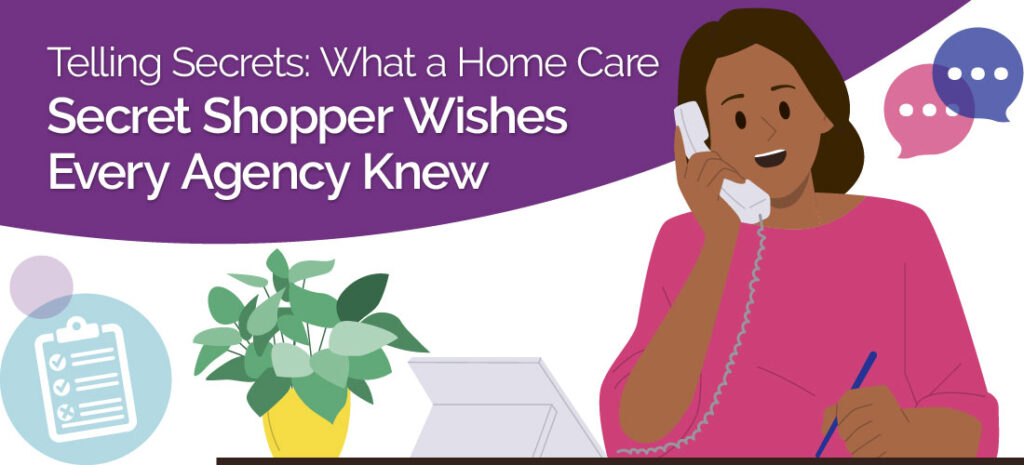
Picture this: the phone rings, and on the other end is someone who has been worrying for days about how to get help for a parent who is struggling at home. Their voice carries the weight of exhaustion and uncertainty. That call might be the first time they have reached out to a home care agency. It is also the exact moment when they will decide, often unconsciously, whether they trust your agency or whether they will keep dialing other numbers.
This is why intake calls are business-critical opportunities to build trust, demonstrate expertise, and show compassion from the very first hello. Yet many agencies have no clear way to measure how those calls sound to a prospective client. There’s a great solution all home care agencies should consider: home care mystery shopping. A home care secret shopper can capture an authentic, unfiltered snapshot of your first impression.
One of our secret shoppers opened up about what they have learned from making calls to agencies across the country, and their feedback might surprise you.
What Agencies Often Get Right
According to our secret shopper, many agencies understand the basics of good call handling. “Most get my name and phone number right away and follow up at least once,” they shared. “That is a good start because it keeps the connection alive beyond the initial conversation.”
They also see agencies offer to email information to the caller, which can be helpful. The problem? “Those emails sometimes take days to arrive. By that time, the family may have already made a decision. Sending follow-up information the same day keeps you in the running.”
The lesson here is simple: when a family is making a care decision, timeliness can be just as important as compassion.
The Most Common Missed Opportunity
One of the biggest oversights the secret shopper notices is that intake specialists rarely highlight what sets their agency apart. “When I do hear about unique training, advanced caregiver certifications, or specialized programs, I immediately pay more attention,” they explained. “It tells me the agency is serious about delivering quality care.”
Unfortunately, this does not happen often enough. Instead, many calls stick to a generic script that could belong to any agency. Without a clear reason to choose one provider over another, families default to price, or simply go with the first agency that makes them feel confident.
The Surprising Deal-Breaker
While lacking details can be a problem, the biggest red flag is tone. “If the person answering the call sounds uninterested, rushed, or robotic, it’s hard to imagine trusting them with someone’s care,” the secret shopper admitted. “Families are looking for warmth, patience, and genuine interest. If that doesn’t come through, the rest is almost irrelevant.”
Behaviors That Push Callers Away
- Rushing through the services without pausing to ask about the caller’s needs.
- Withholding all pricing information until an assessment is scheduled. While exact costs depend on the situation, families appreciate a ballpark range.
- Asking vague questions instead of guiding the conversation. Specific prompts such as, “Would your mother need help with bathing or dressing?” or “Will your father need transportation to medical appointments?” make it easier for callers to explain their needs.
What an Ideal Intake Call Looks Like
When asked to describe the perfect call, our secret shopper painted a clear picture:
- The intake specialist greets the caller warmly and expresses a willingness to help.
- They ask thoughtful questions to understand the situation.
- They confidently explain services, caregiver qualifications, and any unique features of the agency.
- They offer to send information and follow through promptly.
- They make the caller feel heard, respected, and valued.
“When those elements come together, it creates a lasting positive impression,” they said. “That feeling stays with the caller long after they hang up.”
Turning Calls Into Clients
A well-handled intake call can set the tone for the entire client relationship. It can mean the difference between a family feeling relieved and understood, or feeling like they are just another inquiry on a list. In a competitive market, perfecting your intake process is a critical growth strategy.
Discover How Your Calls Sound to Clients
At corecubed, we offer home care secret shopping services that give you a real-world view of how your agency handles intake calls. You will gain specific, actionable insights to improve empathy, speed, and conversion rates, so every call leaves families confident they have found the right partner.
Call us at 800.370.6580 to learn how a home care secret shopper review can help you win more clients from the very first conversation.
